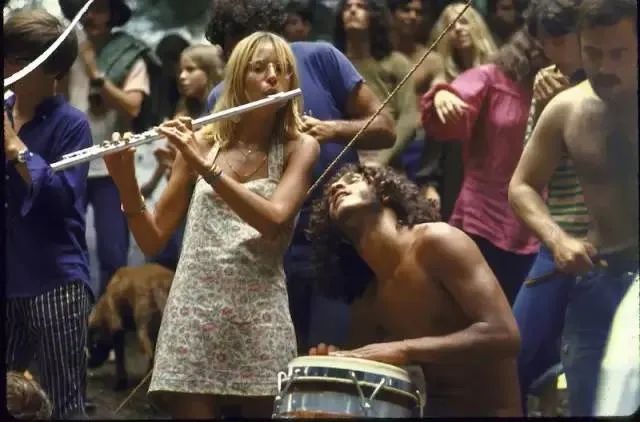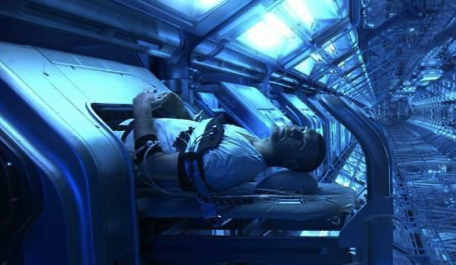In the 1970s, Harvard philosophy professor Robert Nozick asked the question, how to prove that hedonism (the pursuit of pleasure and satisfaction) is the purpose of human behavior?
At that time, the United States was caught in the quagmire of the Vietnam War, and the society was filled with an atmosphere of "hedonism". Young people generally felt that people's behavior was to pursue happiness, satisfaction, and happiness. As long as you can get happy things, it is worth doing.
 August 1969, USA, Woodstock Music Festival
August 1969, USA, Woodstock Music Festival
Nozick did not like this idea, he questioned: What evidence can prove that people live for the pursuit of pleasure?
Nozick's thought experiment
Nozick assumed a scenario, if there is a kind of machine in the world, called a "happy machine" 1 , which can bring you a steady stream of happiness as long as you plug it in. And, you can't tell how this machine happiness is different from real-world happiness.
When this experiment came up, a very common question was: if everyone was plugged in, who would run the machine? Nozick asked people to ignore this concern because it would not adversely affect the thought experiment. One can simply stipulate that these machines are well designed to be fail-safe.
Nozick said that if the goal in life is to experience as much joy as possible, then there is no reason not to tap into the joy machine. Once everyone wants to connect, it proves that human beings are really pursuing hedonism.
This is called the "happy machine hypothesis" in philosophy. Nozick believes that as long as someone gives up access to the pleasure machine, it means that pleasure is not the most important thing for this person, thus proving that human beings have other pursuits.
In his books "Anarchy, State and Utopia" and "Life Under Censorship", he proposed this thought experiment and gave three reasons why people would give up the pleasure machine.
1. People want to do something rather than simply experience happiness.
2. People want to be able to truly be a certain type of person, not to do nothing.
3. People do not want to be confined to artificial reality, but also want to create more things.
Is Nozick right?
Ruan Yifeng believes that 2 , the above three reasons, "To be honest, they are all unconvincing and unprovable hypotheses. Because there is no happiness opportunity in reality, all discussions on this issue are on paper and have no answer."
I appreciate Ruan Yifeng's questioning, but I will explain more.
1. If this joy machine is a fixed facility, people can't move it when it is connected to it, and they have to lie in it all the time. People are definitely not willing to go in, people will think, isn't this a "vegetative person".
People know that lying still all the time is definitely not good for the body. Although it is happy inside, it is not good for health, and it may be short-lived. Who would want this? (Nozick doesn't mention this)
Because of this concern, one can infer that many people may not go in. Then, after entering, you will be cut off from this world, which people do not want.
In short, people have already judged that this thing is not good before going in, even though you describe it as beautiful as heaven.
 'Happy Machine' resembles a dormant pod in a sci-fi movie
'Happy Machine' resembles a dormant pod in a sci-fi movie
2. People know that there are many kinds of happiness, and various kinds of happiness cannot be replaced by each other. People do not want to give up other happiness because of the happiness of a machine.
Enjoying food is a kind of happiness, fitness is another kind of happiness, and love is a kind of happiness.
Traveling is a kind of happiness, playing games is a kind of happiness, watching movies is a kind of happiness.
Learning is a joy, solving problems is a joy, helping others is a joy.
Accompanying children is a kind of happiness, being with friends is a kind of happiness, and being alone is a kind of happiness.
It's just countless joys, but once you go in, you can't enjoy it. Even if Nozick says that machines can stimulate the human brain to produce all of these pleasures, people will feel that something is wrong, that it is too unreliable to lie there and stimulate the brain with a machine.
Therefore, Nozick's thought experiment is problematic. On the surface, people do not choose "happiness machines", but it does not mean that people do not regard happiness as the most important thing.
The real reason for not choosing is that people intuitively reject such a machine from taking control of their lives.”
Of course, if you ask a candidate who is already in it to come out, the answer will be different. In his paper "If You Like It, Does It Matter If It's Real?" 3 , the philosopher Felipe de Brigade changed the choice scenario to the fact that people were already in the happy machine, and asked the experiment participants if they would like to leave the machine. As a result, only about 54% chose to leave. Felipe said that instead of people being reluctant to choose happiness machines, they would prefer to keep the status quo.
Therefore, I think Nozick's question is not good, so that the argument is not so convincing.
A new thought experiment
Let's improve the experiment and stop lying in the machine.
Instead eat 快乐苹果.
There is now a "happy apple" available for free that tastes no different than a normal apple and doesn't have any negative effects on your physical health. Eating one will keep you feeling quiet, peaceful, comfortable, comfortable, content, slightly joyful, and always happy, without any negative emotions. You won't get sick, you won't have accidents, you'll age naturally, and you'll look calmer, healthier, and more beautiful.
The downsides are: eat this apple, you can no longer do anything creative, you no longer have the capacity for curiosity, compassion, and love, you can no longer learn, you can no longer work, you receive meager relief Jin or self-sufficient, living in humble rooms and maintaining basic food and clothing. You have personal freedom, but you don't want to go far, you have no interest in communicating with anyone, you live in isolation, you are estranged from your family, you can't get married, and you can't have children. (Note that this is all prescribed by a thought experiment)
But you do feel comfortable and happy, without any discomfort or discomfort, you don't care about other people's strange eyes at all, you will always live happily like this.
How many people will choose to eat it?
I think there will be quite a few, at least a lot more than those who choose the "happy machine".
This thought experiment can also have an upgraded version:
Every other year, the function of the "happy apple" will fail, you will wake up and return to normal, and then someone will take the "happy apple" and appear in front of you again, asking you if you want to eat another one.
How many people will choose to continue to eat it.
I think most will choose to continue.
The reason given by the person who eats it is very simple: although he lives a very simple and lonely life, he is very healthy and happy!
Maybe you will slap your thigh and shout, isn't this the life of a hermit in Zhongnan Mountain? Yes, it's a bit like, and it feels better than the hermit, because the "happy apple" can keep you healthy and happy all the time, but the hermit may not be able to do it.
 Zhongnan Mountain Hermit
Zhongnan Mountain Hermit
But there are certainly many people who choose not to eat "happy apples".
Why don't you eat it, because you still feel that something is wrong consciously or intuitively?
Is it intuitive that people feel that life without creativity, without learning, without progress, without social connection, without intimacy, without offspring, even if it is healthy and happy, is not worth living?
Or, what do people really want, rooted in their hearts, to learn, to progress, to create, to work, to have social connections, to have intimacy, and to have future generations?
So, I think, to a certain extent, Nozick was right. People don't want to be happy with nothing to do, they want to be happy with positive meaning.
Doing meaningful things mostly brings happiness, and pursuing happiness alone can be overwhelming.
Thought experiments aside, what do people really want?
My point is: It's better to say "nice" than "happy".
Replacing "happy" with the word "good" will be more general. The semantics of "happy" is a little narrower, mainly to describe emotions. Will people think it is a state of euphoria, or a state of giggling? And "good" applies to a very wide range.
1. People pursue a "good" word.
Of course, everyone's definition of good is different, and what you think is good may be what another person thinks bad.
Some people think that "happy" is good, some people think that "calm" is good, and some people think that "melancholy" is good.
As long as it is good, people are satisfied.
2. People not only pursue their own well-being, but also pursue the well-being of their family members, friends, relatives, etc., as long as they are the people he cares about (even if he doesn't care, he just wants those people to be good).
A very caring person, he wants to make the world's people good, even the world's creatures, and even to the extreme to make the world's non-living things good
(he will anthropomorphize these non-living things).Due to cost, cognition and other reasons, he may only pursue one part of the good, but not the other part. For example, he pursues fitness instead of learning; or vice versa.
We can simply refer to a collection of people who "hope well" for a person as his 利益共同体.
3. People not only pursue the present, but also pursue the future.
Some people focus on the good of the present (live in the present, and get drunk at the moment), while others focus on the good of the future (delay pleasure, suffer hardship first, and enjoyment later). But generally speaking, the vast majority of people want the best now and in the future.
To sum up, people pursue the present and the future, and make themselves and their "community of interests" good.
In particular, people have an instinct to always try to make the future of mankind better.
Because not only will their descendants live in the future, but more importantly:
Who knows when he will be reincarnated and live in the future?
Text|Wei Jianvan
references:
The Joy Machine (https://en.wikipedia.org/wiki/Experience_machine)
If there is a happy machine in this world ( https://mp.weixin.qq.com/s/uuTAZ0MIuOMXIN03deRgNw )
De Brigard, Felipe (2010).
If you like it, does it matter if it's real?
. Philosophical Psychology. 23 (1): 43–57.